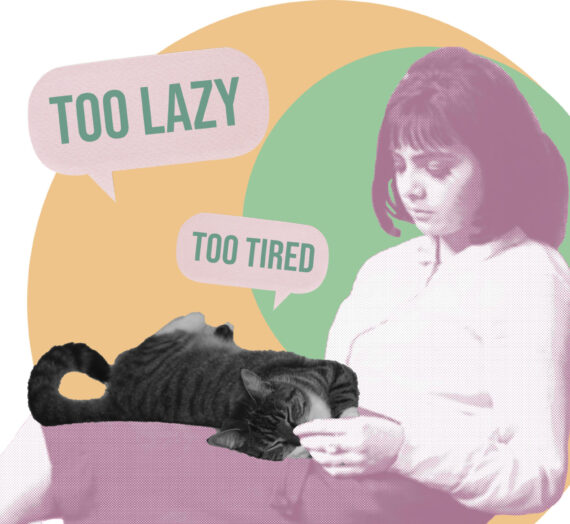Do you find yourself handing out apologies like there’s no tomorrow? You say sorry for everything—from asking for sick time off to the weather not turning out as predicted. It doesn’t matter if it’s beyond your control; you say sorry anyway.
There are so many things wrong with making sorry a thoughtless habit, even when the intentions are often good. So before you cement yourself into a chronic apologizer, read the tips below on how to stop constantly apologizing.
Table of Contents
1. Ask yourself why sorry seems to be your favorite word.
The first step to take to stop yourself from saying sorry all the time is to understand why. It could be one reason, or it could be due to a lot of factors. Figuring out the whys can help you acknowledge that the habit is not necessarily a result of something good. You might find more deep-seated issues which over-apologizing stems from.
Are you a people pleaser? If so, saying sorry could be your way of showing people that your opinion doesn’t matter, and that theirs is always the better one. You apologize for anything that could get in the way of people liking you.
Over-apologizing could also be the result of low self-esteem. You feel like everything you do is burdensome to others, so you say sorry for every little thing. Or, you might think that you can’t do things at the same level as most people, so you apologize to compensate.
You could also be trying to paint yourself as someone nice and harmless. To maintain this reputation, you constantly apologize, thinking that each sorry cleans your slate and renders you blameless in everyone’s eyes. “He/She could never hurt a fly!” This is what you want people to think of you.
Or, it could be a combination of all factors and more. Whatever it is, discover it so you can understand yourself better and resolve to improve for your own well-being.
Related: 3 Ways To Spring Clean Your Heart


In my case, I know it’s mostly because I hate conflict and am a people pleaser. I would rather apologize to stamp any fires out before they burn too high. Unfortunately, I tend to say sorry even when it’s not my fault. While not a bad thing in general, the issue with this is that abusive people tend to think that there’s nothing wrong with their behavior. Which leads us to one of our tips to stop apologizing: knowing the consequences of over-apologizing. Heads up, they’re not good.
2. Understand the repercussions of being a chronic over-apologizer.
Contrary to what you might think, over-apologizing can be downright annoying. Saying sorry for every single thing, even for saying sorry itself, is not exactly what people will find endearing. In fact, some might find it pathetic and wish you would stand up for yourself and stop undermining your abilities to be more likeable.
People can also find you insincere in the long run. When “sorry” becomes a knee-jerk reaction, it turns into a mere expression, nothing more. Apologizing because of a mistake or a weakness that has caused trouble or inconvenience to many is fine. In fact, it’s a sign of humility. However, saying sorry habitually for anything and everything reduces the value of your apology.
What’s worse is if you keep apologizing for the same thing. Now people will really think you’re just saying sorry for the heck of it. Actions speak louder than words. If you’re not doing anything to stop yourself from repeating an error, then don’t apologize, because you’re not really sorry.


Another negative repercussion of over-apologizing is giving up your power. By saying sorry too much, you instantly delegate yourself as a nothing and allow people to treat you like a doormat. People will tend to blame you for things that weren’t even your fault to begin with, simply because you apologized for it in one of your countless sorrys. Also, they start thinking that they’re always right when it comes to you. This can turn into a nasty cycle with an abusive person. And you could be encouraging negative behavior not only from yourself, but also from the people around you.
This may all sound a bit harsh, but sometimes, it’s necessary to say things as they are so that they sink in. If you realize all the negative things that can come from saying sorry too often, then you might be more serious in following these tips on how to stop constantly apologizing.
3. Pause and ask yourself if you did anything wrong.
The next time you feel that sorry come up like word vomit, pause. Take a second to think if this apology is sincere and if you really did something wrong. Asking a question, not responding immediately to all emails and texts, or feeling a certain way are all examples of things you shouldn’t be sorry about. Here are 7 things you shouldn’t apologize for. If it’s anything like this or something out of your control, stop yourself.
Silence can also be good. While you’re pausing, the other person could already be offering a solution, or apologizing if he/she was really the one who made the blunder. We don’t always need to react to everything at once. Take the opportunity to pause whenever you can, such as when responding to texts and emails. Oftentimes, it pays to pause and think it through before you say anything. You might be able to see things more clearly when the dust has settled. In many cases, you might even find that saying sorry would have made things worse!
There are also instances where the person is not ready to hear your sorry just yet, or simply wants someone to listen to his/her troubles. In situations like these, silence and genuinely listening to what they have to say is better than apologizing.


4. Refresh your vocabulary…and your responses.
There are so many words in the dictionary. More than 170,000, in fact! However, you say sorry so often that one would think you didn’t know how to express yourself except with this one word. You say sorry to convey thanks, excuse yourself, show your concern, make requests, and of course, to apologize! Based on what we learned in the second way to stop saying sorry, this couldn’t be leading to the best results, whether in your workplace or personal life.
Therefore, refresh your vocabulary and don’t use “sorry” as a stand-in for everything! Say what you mean, and I know in many cases, it isn’t that you are actually sorry. There are so many other ways to respond to issues and situations, and the appropriate words to express them don’t include your favorite 5-letter word. Whether you’re replying to a complaint about a work issue, receiving help from someone, or anything else under the sun, here are some other ways you can respond:
- When someone helps you out or does you a favor, express gratitude – Thank you so much for being so patient with me. Thank you for respecting my opinion. I really appreciate that you helped me with this.
- When someone is in low spirits, show your concern – I hope that it gets better. I understand and I’m with you. I feel you!
- When someone is complaining about an issue, offer a solution – I think that doing this would help. What can I do to help? This idea might be helpful in this situation.
- When you’re saying no, just be honest – That sounds really fun, but I need some time to rest later. Unfortunately, I’ve already made plans for tomorrow. I’m looking forward to bonding with my family on that day.
- When making requests, point out the positive – I really admire your skills in this and think that you can offer great advice in this issue. You’re really good at doing this, and I would be so thankful if you could show me how to do it, too.
Get more comfortable expressing what you really mean, and stop making apologies your go-to response. Mix and match the ways above and you will be reserving your sorrys for genuine apologies. Also, don’t forget the other magic words: please, thank you, and you’re welcome!
Related: 9 Ways to Incorporate Gratitude Into Your Daily Life
5. Catch yourself, even after you’ve already blurted it out.
Bad habits are very hard to break, even when you have all the reasons to. So though you’ve resolved to never say sorry so haphazardly again, you might still blurt out a “sorry” every now and then, especially in the first few weeks. Don’t be too hard on yourself and instead use those instances to determine what triggered you to say it.
Come up with a list of situations, people, or things that lead you to apologize almost instantly. It helps you know when to keep your guard up and be more careful what you say. You can also assess why these things trigger this reaction from you, revisiting the first tip which is to understand yourself better.
At the same time, think of the things you can say instead of “sorry” in these particular situations or to this person. Use the previous step on how to stop constantly apologizing and use your rediscovered vocabulary to either express your feelings or opinion in a respectful way. Let this be your guide whenever you come across the same trigger.


Here’s an example of this tip in action. When someone says they’re tired after doing you a favor, you automatically apologize for it. This can stem from that feeling of being burdensome to others. If you only ask for favors rarely and if that person was happy to do the favor for you, I don’t think there is a need to apologize. Instead, express your gratitude and offer a way to help. Now, the next time a person does you a favor and expresses some discomfort or inconvenience that indirectly resulted from it, you can be on your guard.
“I really appreciate what you did for me earlier. It was very nice of you. Would you like some tea? It might make you feel better!” I think this can do more good than saying, “I’m so sorry I asked you to do that for me. Now you’re tired and it’s all my fault!” Remember, sorry is not always the best thing to say!
Related: Start Asking For What You Want
6. Love yourself!
And last but probably the most important step of all is to love yourself! If you love someone, you wouldn’t demean, undervalue, or in any way reduce that person’s dignity, would you? This applies to you as well. Over-apologizing, as shown in tip 2, does not do justice to your abilities and values as a person. You are amazing. Even though you have probably been undermining yourself for a long time, the fact that you read this post means that you want to change and believe in your worth.


So make sure you pat yourself on the back for taking a step towards personal growth. Don’t be afraid of affirming yourself and give thanks for who you are, no matter what. Resolve to keep improving! After all, loving yourself doesn’t mean powerlessly submitting to your flaws. Instead, it is resolving to get better at those weaknesses because you know you deserve better from the person you know the most: yourself!
Follow these steps on how to stop constantly apologizing
These 6 tips on how to stop constantly apologizing is not necessarily easy, especially if it has become a deeply ingrained habit. It might be a long process, but this shouldn’t deter you from applying them! Think of the rewards at the end of the journey. I’m sure you will boost your confidence, be happier, and in a better situation to say sorry when the situation actually calls for it. At the same time, people will respect and like you even more! You might also find that people will actually value and seek your opinion more, both in your personal and professional relationships.
As long as you persevere on getting better, you will eventually stop saying the “s” word so carelessly. Believe in yourself! You’ve got this.
Liked this? You might like:
Steps To Take For Better Work-Life Balance
Embrace Change: 3 Tips to Thrive With Transitions
3 Ways To Spring Clean Your Heart










Stef
Love these tips!
Being a Canadian. I find myself saying sorry over anything lol, even when it doesn’t make sense. I am def gonna start using some of these tips in the future! Thanks for sharing
Kathleen
Lol. I definitely blended right in with the “sorry-ing” when I moved to Canada. But over time I’ve realized it’s just not right for me anymore!
Thanks so much for the feedback and I hope they help! 🙂
Michelle
This is so me, I do this constantly and I think to myself why am I saying i’m sorry in this situation when I didn’t do anything wrong?
Kathleen
I feel you, Michelle! It’s become an automatic thing for us, apologizing. Now that we’re aware of it, we should definitely take steps to change our “sorry” ways. I know that we can do it!
AISilva
Thanks for this great post! I fully agree that if you’re constantly saying sorry all the time then it loses it’s worth and at some point becomes insincere. I like that quote you included about saying things without showing it doesn’t mean anything. Thanks for this good perspective on apologizing.
Kathleen
Thank you! I’m so glad you liked it. The more we understand the negative impacts of saying sorry haphazardly, the more we realize that we need to be more careful what we say! Actions truly speak louder than words. 🙂
Nisha | The Power Boss Girls
Great insights! Definitely need this as I find myself apologizing too often
Kathleen
Hi Nisha, thank you so much! Hope you’re able to apply the tips! 😀
Jordan
It’s hard to get away from apologizing for everything. Love tip #5! Thanks for the reminder!
Kathleen
Yaaay! Glad you liked it! 😀 Hope we get to change our “sorry” ways soon! 🙂
Maura
This is definitely a great habit to get into. Maybe some people have just been made to feel like everything is their fault and so this becomes a habit? I also think society makes us feel like we’re constantly offending people. Similar to the sorry habit, I’ve started taking out the word “just.” Like when I start an email with “I just wanted to….” as if I’m bothering someone. These are all good ways to change our communication styles.
Kathleen
Thanks, Maura! I agree, society does play a role definitely. We have to be conscious enough to not get pulled into these negative habits, though. Like what you did with taking out “just”. 🙂
camillepearl23
I’m bad about saying sorry constantly. I always try to be better because my fiance always asks me what I’m apologizing for!
Kathleen
Same here, Camille! It’s great that those who are close to us call us out on it, because they remind us to be more careful about our sorrys. 🙂
Haley Wright
Love this! I have always been so bad about this honestly. I’ve definitely improved as I’ve gotten older, but I notice that I say it often. I think it’s because I hate hurting people’s feelings, so if anything I’m saying is even remotely doing that, I say that I’m sorry. Thanks for sharing!
Kathleen
Hi Haley, thank you so much! I can relate to how you feel! However, it helps to realize that even though we say it with good intentions, the results aren’t always good. 🙂
Amanda Hamm
This is great advice! I love that you suggest alternative responses, because sometimes its just hard to think of something else to say. Thank for sharing!
Kathleen
Thanks, Amanda! I’m glad you found them helpful! I agree! But with practice, hopefully we can think of better ways to say what we mean instead of just saying “sorry”! 🙂
CrazyFitnessGuy
Are you sure you didn’t write this post about me because I am always apologizing for everything
Kathleen
LOL! You’re definitely not alone in that! Hopefully by following some of these tips we can change that. 🙂
olgavin139
I needed this article. I`ll use your tips. Thank you
Kathleen
I’m glad you found it helpful!
Kari
Oh girl, this is ME! I always say sorry, even when I’ve done nothing wrong. Mostly, I don’t want to bother people or inconvience them, so I apologize before my question. So silly! Thanks so much for some great tips on how to stop! Making myself concious of it in the moment is the first step!
Kathleen
Yaay! I can totally relate! I’m glad you found them helpful and here’s to changing our “sorry” ways, Kari! 😀
Kelly Wongkar
Love these tips! It’s absolutely true that if we use “sorry” for everything, we’re watering down the value of our apology. The alternatives you gave were so helpful!
Kathleen
Thanks so much, Kelly! Yes, that’s why we should use our sorrys more wisely! Glad you liked them! 😀
kellyisraelli
Great tips! It’s absolutely true that by over-apologizing, we cause our apology to lose its meaning. I also love the alternatives you gave!
Kathleen
Thanks Kelly! I’m glad you liked them and I hope they help you! 🙂
Angie
I do this all the time! And I hate it! These are great steps to work on!
Kathleen
Thanks Angie! I hope this helps! 😀
Lindy | Happy Humble Haven
I felt like you were speaking right to me as I read this! As a life-long chronic apologizer, this really hit me head on as I made so many connections and revelations about myself! On top of it, you offer great tips and alternatives which I so appreciate. I’ll be referring back to your article this often, since I’m more determined than ever now to break my “s-word” habit!! 😉 Thanks so much again for this!
Kathleen
Wow! I’m so happy this resonated with you, Lindy! I write these posts in the hope that I am able to help people out, so your comment really meant a lot to me. I know you’ll be able to overcome this, and I’ll be cheering for you! I’m also in the process of taking my own advice, and for me it really helps to be aware of this negative habit!
Mihaela | https://theworldisanoyster.com/
In all honesty, I only use words when I truly mean to, and with sorry I am particularly careful. I take an extra second to think before I say something so that I don’t really have to apologise for it after it flew out of my mouth. I sound vane, I know, Sorry! Haha
Kathleen
That’s sounds great, Mihaela. It’s a trait many of us strive for!